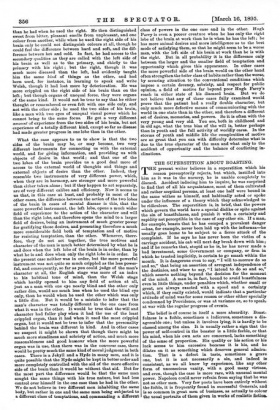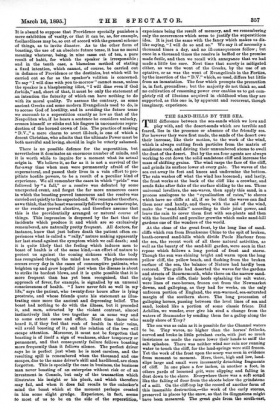THE SUPERSTITION ABOUT BOASTING-.
THE present writer believes in a superstition which his reason peremptorily rejects, but which, instilled into him as it was in the nursery, he is unable completely to discard. Accident inducing him to inquire, he was surprised to find that of all his acquaintance, most of them cultivated and rather sceptical persons, at least one half were bound in the same withes as himself, and habitually acted or spoke under the influence of a theory which they acknowledged to be ridiculous. The superstition is, in brief, that the powers which govern the world have a special dislike or spite against the sin of boastfulness, and punish it with a certainty and rapidity not perceptible in the case of any other sin. If a man, for example, boasts that he has escaped a prevalent danger —has, for example, never been laid up with the influenza—he usually goes home to be subject to a fierce attack of the complaint. If he says he has never been the victim of a carriage accident, his cab will next day break down with him; and if he remarks that, stupid as he is, he has never made a bad investment, some Government or company, or firm in which he trusted implicitly, is certain to go smash within the month. It is dangerous even to say, "I will to-morrow do so and so," that being an assertion of arrogant independence of the destinies, and wiser to say, "I intend to do so and so," which asserts nothing beyond the decision for the moment of the mind. A man is, in fact, bound to avoid boastfulness even in little things, under penalties which, whether small or great, are always exacted with a speed and a certainty which, if they really existed, would indicate that a particular attitude of mind was for some reason or other either specially condemned by Providence, or was at variance or, so to speak, at war with the regular progress of events.
The belief is of coarse in itself a mere absurdity. Boast- fulness is a foible, sometimes a ludicrous, sometimes a dis- agreeable one ; but unless it involves lying, it is hardly to be classed among the sins. It is usually rather a sign that the power of self-control in the boaster is a little feeble, or that his mind, when his own acts are concerned, lacks something of the sense of proportion. His quality or his action or his luck seems to him excessive because it is his, and he dilates on it as something which deserves general admira- tion. That is a defect in taste, sometimes a grave one, but it is not necessarily a sin, and indeed is consistent, as we all know by experience, like any other form of unconscious vanity, with a good many virtues, and even, though the case is more rare, with unusual mental power. Napoleon could never refrain from saying that he was not as other men. Very few poets have been entirely without the foible, it is frequently found in successful Generals, and is so common in great men of business, as actually to colour the usual portraits of them given in works of realistic fiction.
It is absurd to suppose that Providence specially punishes a mere exhibition of vanity, or that it can be, as, for example, foolhardiness may be, so out of accord with the general scheme of things, as to invite disaster. As to the other form of boasting, the use of an absolute future tense, it has no moral meaning whatever, being, in nine cases out of ten, a pure result of habit, for which the speaker is irresponsible ; and in the tenth case, a blameless method of stating a fixed intention, which cannot, of course, be carried out in defiance of Providence or the destinies, but which will be carried out so far as the speaker's volition is concerned. To say "I will dine with you to-morrow" cannot mean, unless the speaker is a blaspheming idiot, "I will dine even if God forbids," and, short of that, it must be only the statement of an intention the futurity of which can have nothing to do with its moral quality. To assume the contrary, as some ancient Greeks and some modern Evangelicals used to do, is to accuse God of hostility, and in avoiding the future tense we succumb to a superstition exactly as low as that of the Neapolitan who, if he hears a sentence he considers unlucky, crosses himself or sticks out his fingers in unconscious repro- duction of the horned crown of Isis. The practice of making a mere charm to avert ill-luck, is one of which a decent Christian, who admits that the ultimate Power must be both merciful and loving, should in logic be utterly ashamed.
There is no possible defence for the superstition, but ilevertheless it dominates an enormous number of minds, and it is worth while to inquire for a moment what its actual origin is. We believe it, so far as it is not a survival of the far-away time when men were permanently afraid of the supernatural, and passed their lives in a vain effort to pro- pitiate hostile powers, to be a result of a peculiar kind of experience. We all remember the cases in which "pride" was followed by "a fall," or a resolve was defeated by some unexpected event, and forget the far more numerous cases in which the boasting proved innocuous and the resolve was carried out quietly to the expected end. We remember therefore, as we think, that the boast was usually followed by a catastrophe, or the resolve proved abortive, and therefore assume that this is the providentially arranged or natural course of things. This impression is deepened by the fact that the incidents which produce it and which are so exclusively remembered, are naturally pretty frequent. All doctors, for instance, know that jag before death the patient often ex- periences what is called a "rally," nature making apparently her last stand against the symptom which we call death; and it is quite likely that the feeling which induces men to boast of health is of the same kind,—an effort of nature to protect us against the coming sickness which the body has recognised though the mind has not. The phenomenon occurs every day in the cases of consumptive patients, who brighten up and grow hopeful just when the disease is about to strike its hardest blows, and it is quite possible that it is more frequent than has yet been recognised, that the approach of fever, for example, is signalled by an unusual consciousness of health. "I have never felt so well in my life," says the patient, who twenty-four hours after is lying prostrate, and whose friends quote his statement as illus- trating once more the ancient and depressing belief. The boast had nothing to do with the illness, but it preceded it, and men, attracted by the violent contrast, almost instinctively link the two together as in some way and to some extent cause and effect. Next time those who heard it, if they feel that rash of health in their veins, will avoid boasting of it ; and the relation of the two will escape attention. Moreover, it must not be forgotten that boasting is of itself a sign of weakness, either temporary or permanent, and that consequently failure follows boasting more frequently than it follows silence. The perfect driver says he is perfect just when he is most careless, and the resulting spill is remembered when the thousand and one escapes, due to the same driver's skill and hardihood, are clean forgotten. This is specially the case in business, the business man never boasting of an enterprise without risk or of an investment in Consols, but only of the transaction which illustrates his insight or his pluck, and which therefore may fail, and when it does fail recalls to the onlooker's mind the boast which at the moment perhaps created in him some slight grudge. Experience, in fact, seems to most of us to be on the side of the superstition, experience being the remit of memory, and we remembering only the occurrences which seem to justify the superstitious idea. It is just the same with the fancy which makes us dis- like saying, "I will do so and so." We say it of necessity a thousand times a day, and no ill-consequences follow ; but once in a thousand times the resolve is baffled or the promise made futile, and then we recall with annoyance that we had made a little too sure. Neat time that surety is mitigated either, as was the wont of the Greeks, by the use of an optative, or as was the wont of Evangelicals in the Forties, by the insertion of the " D.V." which, so used, differs but little from an incantation. The fear which prompts the precaution is, in fact, groundless ; but the majority do not think so, and no cultivation of reasoning power ever enables us to get com- pletely rid of illusions acquired in childhood when they are supported, as this one is, by apparent and recurrent, though imaginary, experience.



































 Previous page
Previous page